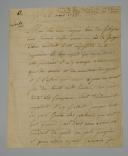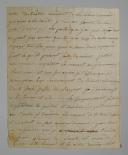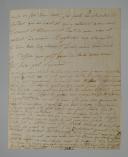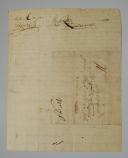
Chouannerie - LETTER FROM JUST SAPINAUD TO HIS BROTHER residing at Baron de Suzanet's in London, March 4, 1796. 18913-1
Sold out
Chouannerie - LETTER FROM JUST SAPINAUD TO HIS BROTHER residing at Baron de Suzanet's in London, March 4, 1796. 18913-1
"My dear friend, after many hardships, we have finally arrived near Fougère without any mishaps. It is impossible to describe to you the great spirit prevailing in this province; what is sorely lacking here are weapons and war supplies, and I assure you that within 4 days we could have over thirty thousand men mobilized. The countryside is decidedly royalist and they are almost daily fighting against the patriots who are very afraid of them. We have been escorted from post to post until now, and we will set off tomorrow towards our destination to Vendée...
I am overjoyed for having chosen the path I have taken..."
He invites his brother to join him and encourages young individuals to enlist.
"... I eagerly await the moment when I will arrive home, and once there, I assure you that I will seriously work on finding ways to send you money. I will also write to your wife without compromising her, explaining the situation, and be sure that one way or another, I will find a way to settle your affairs...
Charette's army still stands at fifteen thousand men, and the other armies are also in excellent condition. I have spoken to Sir Colbert who is coming from there and returning with us..."
"I assure you that I love you with all my heart, your brother Just Sapinaud."
Letter addressed to "Mr. Sapinaud at Mr. Baron de Suzanet, Géra Street No. 19 Soho, London."
Double-page 23 cm x 18.5 cm.
Good condition.
HISTORICAL BACKGROUND:
The Chouannerie was a civil war that opposed Republicans and Royalists in western France, in Brittany, Maine, Anjou, and Normandy, during the French Revolution. It is closely linked to the Vendée War that took place on the left bank of the Loire River to the south, while the Chouannerie occurred in the north. Both of these conflicts are sometimes collectively referred to as the "Wars of the West."
An initial insurrection attempt was made as early as 1791 by the Breton Association to defend the monarchy and restore the specific laws and customs of Brittany that were abolished in 1789. However, a significant part of the Western population's uprising and shift towards counter-revolution was mainly due to the Civil Constitution of the Clergy and the levying of 300,000 men by the Convention.
The first clashes erupted in 1792 evolving from peasant revolts to guerrilla warfare and finally to pitched battles before ending with the Republican victory in 1800. Other smaller and briefer peasant uprisings took place in other departments, notably in Aveyron and Lozère, and were also labeled as Chouannerie. A small chouannerie re-emerged in 1815 during the Hundred Days, and a final uprising occurred during the legitimist insurrection of 1832.
* GENERAL CHARETTE:
In March 1793, the Vendéens rose up against the levée en masse of 300,000 men decided by the Convention. It was considered an excessively heavy effort to defend the French borders threatened by European powers. The measures taken by the incumbent government, the Convention, were seen as an infringement on their freedoms. After three years of fierce battles and ambushes in the winding paths, the insurrection finally saw its last moments in spring 1796.
General Vendéen François-Athanase Charette de la Contrie led an army of Vendéen peasants in major battles, opposing them to the Republican Army. His motto was "Often fought, sometimes beaten, never defeated."
General Charette was the last to confront the repression undertaken by the republican regime of the Terror. Following an intense hunt, the man known as "the king of Vendée" was captured in the Bois de la Chabotterie on March 23, 1796, and then shot in Nantes six days later. His arrest and execution marked the end of the Vendée War.
"My dear friend, after many hardships, we have finally arrived near Fougère without any mishaps. It is impossible to describe to you the great spirit prevailing in this province; what is sorely lacking here are weapons and war supplies, and I assure you that within 4 days we could have over thirty thousand men mobilized. The countryside is decidedly royalist and they are almost daily fighting against the patriots who are very afraid of them. We have been escorted from post to post until now, and we will set off tomorrow towards our destination to Vendée...
I am overjoyed for having chosen the path I have taken..."
He invites his brother to join him and encourages young individuals to enlist.
"... I eagerly await the moment when I will arrive home, and once there, I assure you that I will seriously work on finding ways to send you money. I will also write to your wife without compromising her, explaining the situation, and be sure that one way or another, I will find a way to settle your affairs...
Charette's army still stands at fifteen thousand men, and the other armies are also in excellent condition. I have spoken to Sir Colbert who is coming from there and returning with us..."
"I assure you that I love you with all my heart, your brother Just Sapinaud."
Letter addressed to "Mr. Sapinaud at Mr. Baron de Suzanet, Géra Street No. 19 Soho, London."
Double-page 23 cm x 18.5 cm.
Good condition.
HISTORICAL BACKGROUND:
The Chouannerie was a civil war that opposed Republicans and Royalists in western France, in Brittany, Maine, Anjou, and Normandy, during the French Revolution. It is closely linked to the Vendée War that took place on the left bank of the Loire River to the south, while the Chouannerie occurred in the north. Both of these conflicts are sometimes collectively referred to as the "Wars of the West."
An initial insurrection attempt was made as early as 1791 by the Breton Association to defend the monarchy and restore the specific laws and customs of Brittany that were abolished in 1789. However, a significant part of the Western population's uprising and shift towards counter-revolution was mainly due to the Civil Constitution of the Clergy and the levying of 300,000 men by the Convention.
The first clashes erupted in 1792 evolving from peasant revolts to guerrilla warfare and finally to pitched battles before ending with the Republican victory in 1800. Other smaller and briefer peasant uprisings took place in other departments, notably in Aveyron and Lozère, and were also labeled as Chouannerie. A small chouannerie re-emerged in 1815 during the Hundred Days, and a final uprising occurred during the legitimist insurrection of 1832.
* GENERAL CHARETTE:
In March 1793, the Vendéens rose up against the levée en masse of 300,000 men decided by the Convention. It was considered an excessively heavy effort to defend the French borders threatened by European powers. The measures taken by the incumbent government, the Convention, were seen as an infringement on their freedoms. After three years of fierce battles and ambushes in the winding paths, the insurrection finally saw its last moments in spring 1796.
General Vendéen François-Athanase Charette de la Contrie led an army of Vendéen peasants in major battles, opposing them to the Republican Army. His motto was "Often fought, sometimes beaten, never defeated."
General Charette was the last to confront the repression undertaken by the republican regime of the Terror. Following an intense hunt, the man known as "the king of Vendée" was captured in the Bois de la Chabotterie on March 23, 1796, and then shot in Nantes six days later. His arrest and execution marked the end of the Vendée War.
Reference :
18913-1

Next update Friday, december 26 at 13:30 PM
FOR ALL PURCHASES, PAYMENT IN MULTIPLE CHECKS POSSIBLE
bertrand.malvaux@wanadoo.fr 06 07 75 74 63
SHIPPING COSTS
Shipping costs are calculated only once per order for one or more items, all shipments are sent via registered mail, as this is the only way to have proof of dispatch and receipt.
For parcels whose value cannot be insured by the Post, shipments are entrusted to DHL or Fedex with real value insured, the service is of high quality but the cost is higher.
RETURN POLICY
Items can be returned within 8 days of receipt. They must be returned by registered mail at the sender's expense, in their original packaging, and in their original condition.
AUTHENTICITY
The selection of items offered on this site allows me to guarantee the authenticity of each piece described here, all items offered are guaranteed to be period and authentic, unless otherwise noted or restricted in the description.
An authenticity certificate of the item including the description published on the site, the period, the sale price, accompanied by one or more color photographs is automatically provided for any item priced over 130 euros. Below this price, each certificate is charged 5 euros.
Only items sold by me are subject to an authenticity certificate, I do not provide any expert reports for items sold by third parties (colleagues or collectors).
FOR ALL PURCHASES, PAYMENT IN MULTIPLE CHECKS POSSIBLE
bertrand.malvaux@wanadoo.fr 06 07 75 74 63
An authenticity certificate of the item including the description published on the site, the period, the sale price, accompanied by one or more color photographs is automatically provided for any item priced over 130 euros. Below this price, each certificate is charged 5 euros.
Only items sold by me are subject to an authenticity certificate, I do not provide any expert reports for items sold by third parties (colleagues or collectors).



